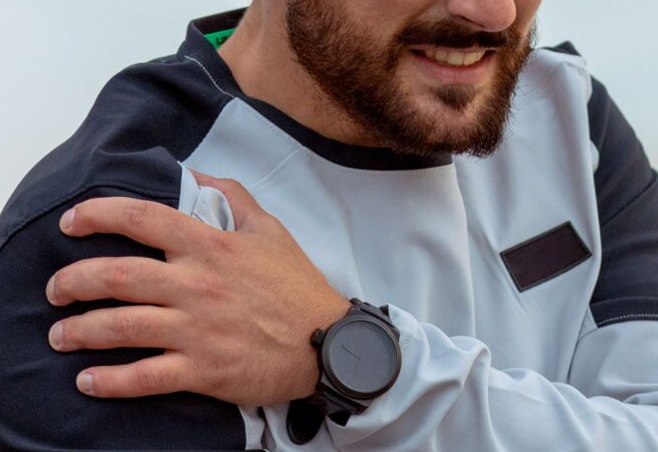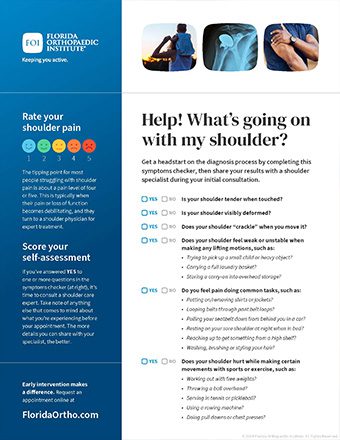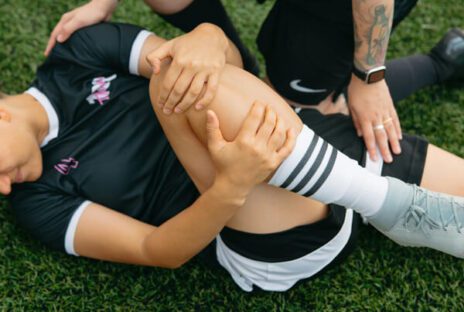When to get a cortisone shot for shoulder pain

A cortisone shot is a simple in-office procedure that relieves pain and swelling for weeks or even months. It’s used to treat chronic and acute shoulder pain, such as a rotator cuff injury that doesn’t require surgery but doesn’t respond to a steady course of rest, ice, and oral medication. A combination of physical therapy and a cortisone shot for shoulder pain can help your pain and increase your function. Specialists often use this treatment for people with full-thickness tears who can’t have surgery.
A shoulder cortisone shot is injected into the joint, and it’s a potent drug with rare serious side effects. Joint injections should be administered by a healthcare provider with shoulder pain treatment experience, including physician assistants and nurse practitioners.
Keep reading to learn when doctors recommend a cortisone shot for shoulder pain, how it works, and what to expect from the procedure.
What are cortisone shots for shoulder pain?
A cortisone shot is the strongest type of steroid injection, but it’s not the same type of steroid that athletes use to build muscle. The purposes of a cortisone shot for shoulder pain are to reduce joint inflammation for pain management and to diagnose the source of a joint problem. It doesn’t repair damage or cure a chronic condition.
A cortisone injection combines one of five different drugs, depending on the doctor’s preference and patient’s needs, to provide longer periods of pain relief than oral medications like prednisone.
Cortisol reduces swelling by interacting with cells in the shoulder joint’s lining. These cells work with the immune system to fight inflammation in its tendons and bursae (the fluid-filled sacs that cushion the spaces in the shoulder joint).
Specialists use steroid injections to treat joint pain in the shoulder, back and neck, feet and ankles, hands and wrists, hips and thighs, and knees.
Other terms for a cortisone shot include:
- Corticosteroids
- Steroid injection
- Steroid injection therapy
- Betamethasone, such as Celestone
- Methylprednisolone, such as Depo-Medrol and Solu-Medrol
- Triamcinolone, such as Kenalog and Aristospan
Cortisone shoulder shot benefits
A cortisone shot in the shoulder targets a precise spot in the joint rather than general upper arm/shoulder pain. It reduces swelling and improves the range of motion in that area to help you manage pain and return to day-to-day activities. It also makes it easier to do physical therapy while rehabilitating a shoulder injury. A steroid shot for shoulder pain can last for several weeks up to a couple of months. A single shot is often sufficient.
It can take a few days to a week or two for the medicine in a cortisone shot to take effect and start providing relief. Cortisone shots include an anesthetic, unlike other injections such as stem cells and platelet-rich plasma (PRP). The anesthetic provides some immediate pain relief until the stronger effect from the cortisone kicks in.
Side effects of steroid shots for the shoulder
A cortisone injection is a common, low-risk procedure. Serious side effects are rare. The most important thing to know about a cortisone shoulder injection is that it can take a couple of days to work as the steroid reacts with the cells in the joint lining. In the meantime, you may experience temporary flares of pain at the site of the injection. Icing them usually helps.
Because cortisone shots can cause a spike in blood sugar, people with diabetes should discuss this treatment option with their providers before receiving injections. In addition to adjusting their diets and other medications, those living with diabetes may also need to check their blood sugar levels more frequently after receiving cortisone shots for shoulder pain.
Other side effects include:
- Temporary swelling
- Discoloration, redness, sensitivity, and infection at the site of the injection
- Allergic reactions
- Tendon damage
- Cartilage damage
Multiple cortisone shots may increase the risk of osteoporosis, tissue breakdown, cartilage damage, and weakened tendons prone to rupture. Physicians limit the number of cortisone shots in shoulder areas to avoid damaging other parts of the shoulder.

Conditions treated with shoulder steroid shots
Cortisone is used to treat persistent joint pain, chronic conditions, and acute injuries that need a long time to heal. The common targets include:
- Arthritis: Pain relief for stiff shoulder joint stiffness caused by arthritis can last for a month or more
- Autoimmune diseases: In addition to reducing joint swelling, cortisone works on white blood cells to slow the immune system, providing relief for inflammatory diseases like rheumatoid arthritis and multiple sclerosis
- Bursitis or tendinitis: When over-the-counter medications don’t help alleviate pain from bursitis or tendinitis, a cortisone injection directly into the bursa can deliver more intense pain relief
- Impingement: Cortisone injections aid in physical therapy for shoulder impingement, reducing the need for surgery
- Rotator cuff disease or frozen shoulder: In addition to cortisone shots, physical therapy can effectively reduce the pain and swelling associated with rotator cuff disease or frozen shoulder.
FAQs about shoulder cortisone shots
These are the top questions from patients related to rotator cuff steroid shots and other conditions.
How do I know if I need a cortisone shot for my shoulder?
You might have a rotator cuff injury if it hurts when you lift your arm past 90 degrees overhead or to the side. If the pain and swelling don’t improve with at-home remedies, the next step could be the stronger treatment of a cortisone shot.
Also, your doctor may recommend a cortisone shot for shoulder problems to help diagnose the cause or manage a chronic condition.
What happens when I get a shoulder steroid injection?
In a doctor’s office, some physicians may numb the spot with a topical spray before administering the injection with a small needle. Occasionally, ultrasound guidance is used to increase accuracy.
Do shoulder cortisone injections hurt?
Not much. A shoulder cortisone shot is fairly painless, especially compared to cortisone shots in the foot or hand. You might feel a little sting when the needle is injected. Any discomfort usually lasts just a few seconds.
Who isn’t a good candidate for shoulder cortisone shots?
You may not be able to have a cortisone shot for shoulder pain if you have uncontrolled diabetes, uncontrolled hypertension, glaucoma, or an allergy to any of the ingredients in the injection. Additionally, patients who take blood thinners or have a bleeding disorder can experience complications from cortisone shots.
Physicians may recommend conservative treatment as the first step for athletes with shoulder pain from throwing a ball or mild rotator cuff pain.
How long do the effects of steroid shoulder shots last?
A steroid shot in shoulder joints should last at least a few weeks. Depending on the underlying cause of the pain, a cortisone shot for shoulder pain may provide relief that lasts several months.
Do shoulder steroid injections help or just mask pain?
A steroid injection for rotator cuff injuries and other acute conditions treats the pain. It doesn’t repair the injury. Reduced pain and swelling let you resume daily activities and heal with physical therapy.
Get a shoulder steroid injection at FOI
A cortisone shot for shoulder pain may provide long-lasting relief for mild to severe shoulder problems and can help some patients avoid surgery. Pain that doesn’t respond to at-home remedies usually indicates a deeper problem.
Florida Orthopaedic Institute’s orthopedic specialists provide comprehensive and convenient options for diagnosing and treating shoulder pain through cutting-edge technology, award-winning expertise, cortisone injections, imaging, physical therapy, urgent care, and surgery—all in one place.
Schedule With a Physician or Request an Appointment to book an appointment to discuss your shoulder pain and treatment options with an orthopedic physician.
You might also like:
- Reverse Total Shoulder Arthroplasty
- How FOI Repaired a Shoulder After a Skydiving Accident
- Post-Operative Rotator Cuff Complications

Help! What’s going on with my shoulder?
January 3, 2025


